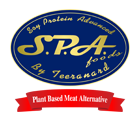



SPA Foods
The Happiness you can eat.
Story : Thailand Restaurant News Magazine / Issue 72 / May 2006
Photo : Thailand Restaurant News Magazine
Whether it is the humanity or personal health conscious, vegetarian diet trend has stretched throughout the globe. In Thailand alone, Kasikorn Research Center estimated the market value for vegetarian diet at Bt1.65 million, an increase of 10 per cent from the previous year. The research also revealed two-thirds of Bangkok respondents were determined to practice vegetarian, not only to purify their soul but also their body.
However, practicing vegetarian seriously often results in not getting enough nutrition while those consuming dairy products gain too much weight in short time.
Being a serious vegetarian for years, Nutrition House’s founder Teeranard Chokwatana became involved with the soy meat production thanks to a few frustrations in vegetarian life. From a small vegetarian eatery “Vegetarian Cottage” that served only neighbours in Soi Chokchai Ruammit in 1992, Teeranard now becomes the founder of Nutrition House that manages five animal protein-free restaurants and a soy food factory. The house for healthy food is producing ready meal under SPA Foods brand and soy food ingredients under JV brand that are second to none in terms of presentation, texture and flavours.
The Beginning
It all started over 10 years ago when she had to watch her mother suffering from cancer that she became interested in product made from soybeans. “Watching her die a slow painful death almost killed me,” Teeranard recalls the pains that her mother had to go through especially after meals. Such meals comprising traditional vegetarian ingredients were hard for a patient to digest.
Being treated like a “second-class citizen” in general restaurants, “it was almost an insult that we always ended up eating stir-fried vegetables.” The in-flight menu does not cater a vegetarian flyer like her. The frustration forced her to open her own homey “Vegetarian Cottage” serving animal protein-free dishes.
Being a connoisseur herself, Teeranard didn’t surrender to the traditional “mee-gung” made from wheat flour and the different looks of mock meats made from soybean fibre. “Practising vegetarian doesn’t mean you’ve to give up texture, taste and flavours you enjoy in the animal protein food,” she says.
It worked. She opened her second branch in Isetan Department Store. However, it wasn’t a success due to mismanagement and sharp rising of rental fee. The branch was so overcrowded that she once saw a staff not welcoming customers. “It’s against our motto: The happiness you can eat.” Another branch, therefore, was later opened on Rama IX Road because it targets directly to the hard cores.
Factory for Healthy Soy Food : The First and Only in the World
Supply shortage remains one of the biggest obstacles for any factory. During Je Festival (10-day vegetarian festival annually held around October), all the vegetarian cooking materials are sent to Yaowarat – the so-called centre of the festival. The frustration again forced Teeranard to open her own factory to supply raw material for her outlets and serve the general public in supermarkets and health-oriented restaurants.
The business apparently went well until the GMO attack in 2002. Such attack slowed down her production, market expansion and advertising plans. “We were not confident in the quality of the GMO soybean,” says Teeranard who is committed to the manufacture only healthy meat-free, nutritionally balanced alternatives. The raw soybean was later substituted by non-GMO material despite the fact that it added another 20 to 40 per cent to the production cost.
Research & Development : The Leader of the Healthy Food Industry
Years of experiences in research and academic consults with Adjunct Prof Dr Mark Messina, Dr Aaron Tabor and Dr Adamasco Cupisti finally allowed Teeranard to come up with a nutritionally balanced product for those who are concerned about what they eat. Her soy meat is made entirely from soybean combined with herbs and spices to create the texture, taste and flavour of a real meat it imitates.
Soy protein is low in saturated fat and contains no choresterol. It also contains Omega-3 fatty acid which is claimed by several academic researches to lower the risk of heart disease, cancer and other chronic diseases. Soy protein, derived from the soybean, offers a complete protein profile equal to meat and dairy products.
The list of soy food includes soy meatloaf, Frankfurter soy sausage, soy bacon, roast soy duck and red meat, to name just a few.
Most importantly, Teeranard experimented the product on herself. She lost eight kilograms in two months and remained healthy. According to countless of researches, scientists encourages people to lower their consumption on animal protein since it is a source of saturated fat and high cholesterol.
